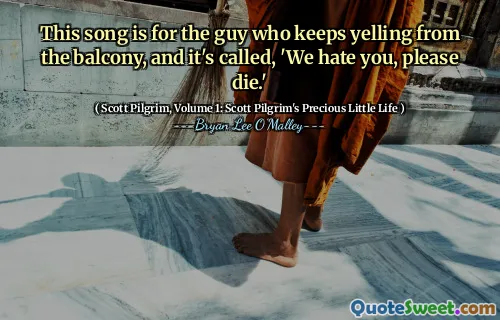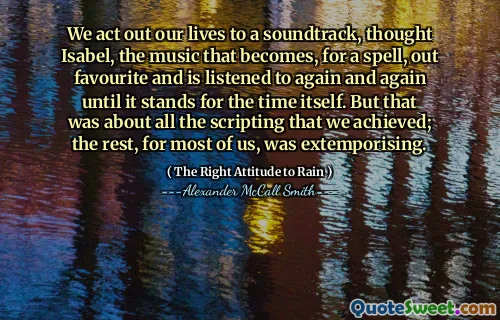
This song is for the guy who keeps yelling from the balcony, and it's called, 'We hate you, please die.'
This quote offers a raw glimpse into outward expressions of intense emotion and possibly pain. The guy yelling from the balcony seems to be experiencing deep resentment or anger, possibly directed at someone he feels harmed or misunderstood him. The act of singing or shouting a song with such a hostile title underscores a need for catharsis—an outlet for feelings that might otherwise be suppressed. It also shines a light on the human tendency to lash out, especially when confronted with frustration or perceived injustice. The phrase 'please die' highlights a disturbing level of hostility that underscores how destructive unresolved anger can be, indicating a point where feelings turn to harm rather than reconciliation.
From a broader perspective, this quote invites us to consider the ways people communicate their inner turmoil—sometimes through words that seem aggressive or irrational. It also touches on the power of voice and expression, illustrating how vocal outbursts can be symbolic acts—possibly seeking validation, attention, or simply a way to be heard. The setting of yelling from a balcony makes it feel like a public display, which could suggest a desire for acknowledgment or a means to assert dominance or frustration in a visible way. It acts as a mirror to societal issues where people might feel ignored or marginalized, pushing them to raucous, confrontational expressions. Despite the hostility of the content, there's an underlying universality to the feeling of wanting to be seen and heard in moments of vulnerability. Recognizing these expressions can foster empathy, reminding us that often, destructive language stems from pain and a need for connection, even if the method is misguided or harmful.
Overall, this quote encapsulates complex human emotions — anger, vulnerability, the need for recognition, and the destructive ways these emotions can sometimes be externalized.



